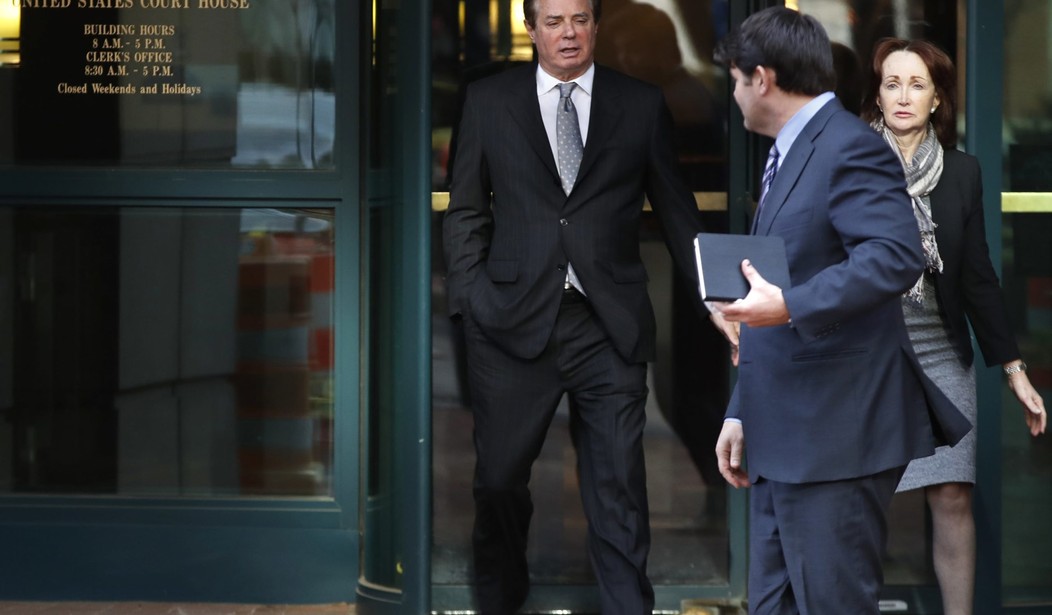WASHINGTON — Special counsel Robert Mueller responded to former Trump campaign chairman Paul Manafort’s motion to dismiss charges by filing a memo showing authorization from the deputy attorney general to investigate an unknown number of individuals for collusion or financial crimes related to the Russia investigation.
In February, arguing that Mueller had exceeded the scope of his investigative authority, Manafort filed a motion to dismiss the superseding indictment. That includes charges of conspiracy against the United States, money laundering, operating as an unregistered agent of a foreign government, and more.
In response to that motion, Mueller late Monday filed a 282-page opposition response that includes a heavily redacted memo from Deputy Attorney General Rod Rosenstein, dated Aug. 2, 2017, elaborating as it relates to certain individuals on the scope of the investigation authorized by Rosenstein upon appointment of the special counsel on May 17, 2017.
The mostly classified memo blocks out copy equivalent to about a page, noting the May appointment order “was worded categorically in order to permit its public release without confirming specific investigations involving specific individuals” and including the description of the allegations that “were within the scope of the Investigation at the time of your appointment are are within the scope of the order.”
The only individual allegations not redacted in the filing are those against Manafort: that he “committed a crime or crimes by colluding with Russian government officials with respect to the Russian government’s efforts to interfere with the 2016 election for President of the United States, in violation of United States law,” and that he “committed a crime or crimes arising out of payments he received from the Ukrainian government before and during the tenure of President Viktor Yanukovych.”
Mueller explained that the redactions were necessary “to protect against the disclosure of classified and sensitive law enforcement information,” and he noted that “Manafort has not previously been provided with a copy of this memorandum.”
“You therefore have authority to continue and complete the investigation of those matters and additional matters described in 28 C.F.R. § 600.4(a),” Rosenstein wrote, referring to the jurisdictional powers of the special counsel. “For additional matters that otherwise may have arisen or may arise directly from the Investigation, you should consult my office for a determination of whether such matters should be within the scope or your authority.”
“If you determine that additional jurisdiction is necessary in order to fully investigate and resolve the matters assigned, or to investigate new matters that come to light in the course of your investigation, you should follow the procedures set forth in 28 C.F.R. § 600.4(b),” Rosenstein added.
Mueller argued that “beyond his failure to show any error, Manafort has not shown that he has rights to enforce in the Special Counsel regulations, 28 C.F.R. Part 600” as “the internal allocation of prosecutorial power within the Department of Justice under the Special Counsel regulations provides no basis for a defendant to seek dismissal of an indictment.”
“None of the authorities Manafort cites justifies dismissing an indictment signed by a duly appointed Department of Justice prosecutor based on an asserted regulatory violation, and none calls into question the jurisdiction of this Court,” he added.
The special counsel’s court filing notes that “an investigation of possible ‘links and/or coordination’ between the Russian government in its political-interference campaign and ‘individuals associated with the campaign of President Donald Trump’ would naturally cover ties that a former Trump campaign manager had to Russian associated political operatives, Russian-backed politicians, and Russian oligarchs.”
“It would also naturally look into any interactions they may have had before and during the campaign to plumb motives and opportunities to coordinate and to expose possible channels for surreptitious communications,” Mueller adds after citing Rosenstein’s original order. “And prosecutors would naturally follow the money trail from Manafort’s Ukrainian consulting activities. Because investigation of those matters was authorized, so was prosecution.”
Manafort’s dismissal argument “ignores the requirement that the matter must arise ‘directly’ from the investigation—a clear signal that the Special Counsel’s discovery of criminal conduct that is incidental to or disconnected from the core mandate will not be automatically covered,” Mueller wrote.









Join the conversation as a VIP Member